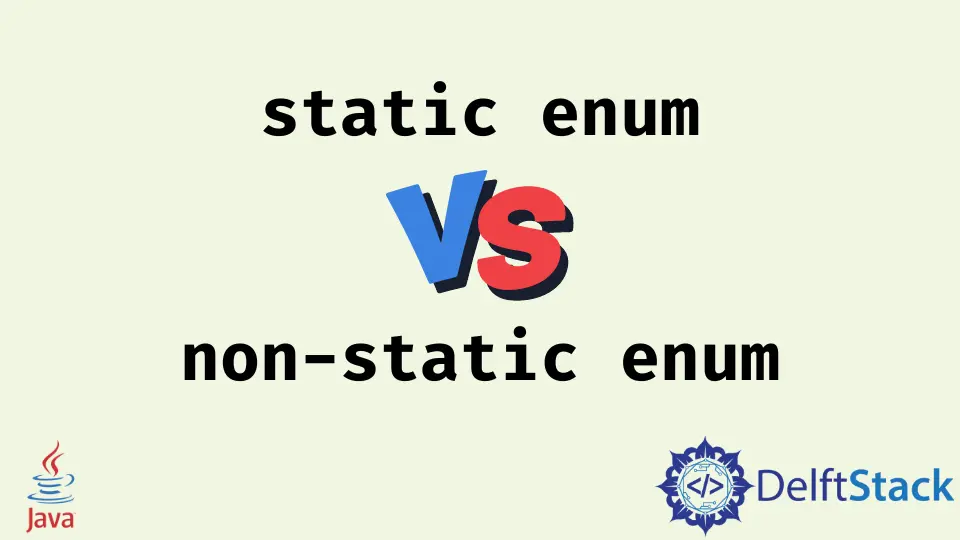Static VS Non-Static Enum in Java
- Understanding Static Enums in Java
- Exploring Non-Static Enums in Java
- Key Differences Between Static and Non-Static Enums
- Conclusion
- FAQ

Enums, or enumerations, in Java are a powerful feature that allows developers to define a set of named constants. They are particularly useful when you have a fixed set of related values, such as days of the week or states in a process. However, Java provides two distinct types of enums: static and non-static. Understanding the difference between these two can enhance your programming skills and help you write more efficient code.
In this article, we will explore static and non-static enums, their differences, and when to use each. By the end, you’ll have a solid grasp of how to implement enums effectively in your Java applications.
Understanding Static Enums in Java
Static enums are defined as part of a class or interface and are inherently static. This means that they belong to the class itself rather than to any specific instance of the class. Static enums are the most common type of enum you will encounter in Java. They are used to represent fixed sets of constants that are not expected to change during the execution of a program.
Here is a simple example of a static enum in Java:
public class Days {
public enum Day {
SUNDAY, MONDAY, TUESDAY, WEDNESDAY, THURSDAY, FRIDAY, SATURDAY
}
public static void main(String[] args) {
Day today = Day.MONDAY;
System.out.println("Today is: " + today);
}
}
In this code, we define an enum called Day within the Days class. Each day of the week is a constant in this enum. In the main method, we declare a variable today of type Day and assign it the value Day.MONDAY. Finally, we print out the value of today.
Output:
Today is: MONDAY
Static enums are straightforward to use and are ideal for situations where the set of values is predetermined and should remain constant throughout the program’s lifecycle.
Exploring Non-Static Enums in Java
Non-static enums, on the other hand, are less common and can be a bit more complex. A non-static enum is defined within a class but does not have the static modifier. This means that the enum is tied to instances of the class, allowing for more dynamic behavior. Non-static enums can be particularly useful when the values they represent may change based on the state of the object.
Here’s an example of a non-static enum in Java:
public class TrafficLight {
public enum Light {
RED, YELLOW, GREEN
}
private Light currentLight;
public TrafficLight(Light initialLight) {
this.currentLight = initialLight;
}
public void changeLight() {
switch (currentLight) {
case RED:
currentLight = Light.GREEN;
break;
case GREEN:
currentLight = Light.YELLOW;
break;
case YELLOW:
currentLight = Light.RED;
break;
}
}
public void displayLight() {
System.out.println("Current light: " + currentLight);
}
public static void main(String[] args) {
TrafficLight light = new TrafficLight(Light.RED);
light.displayLight();
light.changeLight();
light.displayLight();
}
}
In this example, we define a non-static enum called Light within the TrafficLight class. The TrafficLight class has a currentLight variable that holds the current state of the traffic light. The changeLight method alters the state of the light based on its current value.
Output:
Current light: RED
Current light: GREEN
In this case, the enum is used to represent the state of a traffic light, which can change based on the object’s behavior. Non-static enums are beneficial when the enum values need to reflect the state of an instance.
Key Differences Between Static and Non-Static Enums
Understanding the differences between static and non-static enums can help you choose the right approach for your programming needs. Here are some key distinctions:
- Scope: Static enums are associated with the class itself, while non-static enums are tied to instances of the class.
- Usage: Static enums are used for fixed sets of constants, whereas non-static enums can represent values that change based on the object’s state.
- Memory Management: Static enums are loaded into memory once when the class is loaded, while non-static enums can be created multiple times based on object instantiation.
When deciding between static and non-static enums, consider how you plan to use the enum values. If you need a fixed set of constants, go with static enums. If your enum needs to reflect varying states, opt for non-static enums.
Conclusion
In summary, both static and non-static enums in Java serve unique purposes and are essential tools for developers. Static enums are ideal for fixed sets of constants, while non-static enums offer flexibility for dynamic states within an object. By understanding the differences and applications of each type, you can enhance your Java programming skills and write more effective code. Whether you’re building a simple application or a complex system, mastering enums will undoubtedly improve your coding capabilities.
FAQ
-
What is an enum in Java?
An enum in Java is a special data type that enables a variable to be a set of predefined constants. -
Can enums have methods in Java?
Yes, enums can have methods, constructors, and even fields, just like regular classes. -
How do I iterate through an enum in Java?
You can use the values() method to get an array of the enum constants and then loop through them. -
Can an enum implement interfaces in Java?
Yes, enums can implement interfaces, allowing for polymorphic behavior. -
What are the advantages of using enums in Java?
Enums provide type safety, improved readability, and easier maintenance compared to using constant values.
